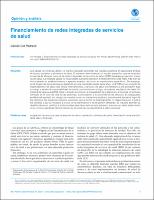Financiamiento de redes integradas de servicios de salud
Financing of integrated health service networks
Date
2020ISSN
1680 5348
Author
Metadata
Show full item recordAbstract
[RESUMEN]. Los países de América Latina y el Caribe necesitan aumentar sus recursos públicos en salud para ampliar el acceso equitativo y eficiente a la salud. El aumento debe financiar un modelo específico que ha mostrado evidencia de eficacia, como el de redes integradas de servicios de salud (RISS) basadas en atención primaria de salud. La literatura global no ha prestado suficiente atención al financiamiento a las RISS; más bien se ha focalizado en establecimientos y agentes aislados, así como en mecanismos específicos. Sin embargo, en la Región de las Américas su desarrollo es una necesidad desde hace años. Una RISS es un conjunto de organizaciones de salud que ofrece intervenciones y servicios de salud coordinados a una población bajo su cargo y asume la responsabilidad de salud y económica en el logro de mejores resultados de salud. Un sistema de pago a una RISS debe ir dirigido a promover la integralidad de la atención y a fomentar un enfoque centrado en el ciclo de vida de las personas, la articulación y la coordinación de servicios. El presupuesto poblacional ajustado por riesgos se muestra como un mecanismo posible y potente para apoyar el logro de los objetivos. Su desarrollo requiere reconocer que la forma de financiamiento no responderá por sí sola a los desafíos y que se necesita, a la vez, de la planificación y de la gestión sanitarias. Se requiere abordar los desafíos técnicos, políticos e institucionales para tener éxito en este esfuerzo, que a su vez debe estar inserto en el proceso global de transformación de los sistemas de salud hacia la salud universal. [ABSTRACT]. The countries of Latin America and the Caribbean need to increase their public resources in health to expand equitable and efficient access to health. The increase should finance a specific model with proven effectiveness, such as integrated health service networks (IHSN) based on primary health care. The global literature has not paid sufficient attention to financing IHSN; rather, it has focused on isolated facilities and agents, as well as on specific mechanisms. However, in the Region of the Americas, their development has been a necessity for years. An IHSN is a group of health organizations that offers coordinated health interventions and services to a population under their charge and assumes health and economic responsibility for achieving better health outcomes. A system of payment to an IHSN should be aimed at promoting the integrality of care and encouraging a focus on the life cycle of individuals, the articulation and the coordination of services. The risk-adjusted population budget is a possible and powerful mechanism to support the achievement of the objectives. Its development requires the recognition that the type of financing alone will not respond to the challenges and that there is a need for both health planning and health management. The technical, political and institutional challenges need to be addressed to succeed in this effort, which in turn must be embedded in the overall process of transforming health systems towards universal health.
Subject
Citation
Cid Pedraza C. Financiamiento de redes integradas de servicios de salud. Rev Panam Salud Publica. 2020;44:e121. https://doi.org/10.26633/RPSP.2020.121
Collections
This notice should be preserved along with the article's original URL.Attribution-NonCommercial-NoDerivs 3.0 IGO
Related items
Showing items related by title, author, creator and subject.
-
Villacrés, Tatiana; Mena, Ana Cristina (2017-05)Objetivo. El objetivo de este artículo es analizar la propuesta planteada por el Ministerio de Salud Pública para la reforma del modelo de financiamiento público en Ecuador referente a mancomunación de fondos y mecanismos ...
-
Báscolo, Ernesto; Houghton, Natalia; Del Riego, Amalia (2018)[RESUMEN]. Objetivo. Caracterizar los procesos de reforma del sistema de salud implementados en ocho países de América Latina y evaluar sus resultados en las condiciones de acceso y cobertura de salud. Métodos. Se combina ...
-
Fitzgerald, James (2023)[RESUMEN]. En este artículo de opinión y análisis se describen las líneas de acción estratégicas para desarrollar siste- mas de salud resilientes y al mismo tiempo promover la recuperación en la etapa posterior a la pandemia ...





